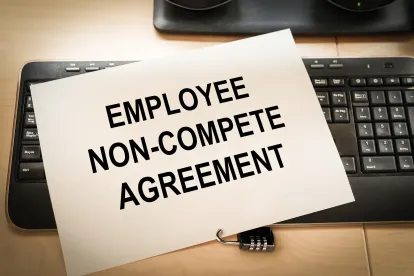In New York state, both houses of the Legislature have passed S.3100A/A.1278-B, which would add a new section 191-d to the Labor Law prohibiting “non-compete agreements and certain restrictive covenants.” The bill awaits the Governor’s signature. Thus, whether, and to what extent, restrictive covenants in the employment context will continue to be enforceable in New York, is, as of June 23, 2023, an open question.
The bill provides that section 191-d(2) of the Labor Law shall read:
No employer or its agent, or the officer or agent of any corporation, partnership, limited liability company, or other entity, shall seek, require, demand or accept a non-compete agreement from any covered individual.
Section 191-d(1)(a) and (b) define both the term “non-compete agreement” and the term “covered individual”:
(a) “non-compete agreement” means any agreement, or clause contained in any agreement, between an employer and a covered individual that prohibits or restricts such covered individual from obtaining employment, after the conclusion of employment with the employer included as a party to the agreement; and
(b) “covered individual” means any other person who, whether or not employed under a contract of employment, performs work or services for another person on such terms and conditions that they are, in relation to that other person, in a position of economic dependence on, and under an obligation to perform duties for, that other person.
Section 191-d(3) declares void “every contract by which anyone is restrained from engaging in a lawful profession, trade, or business of any kind.”
Section 191-d(4) provides that a covered individual may bring a civil action within two years from when the prohibited non-compete was signed or when the covered individual learns of the non-compete or when the employment or contractual relationship terminates, or when the employer “takes any step” to enforce the non-compete. Under this subsection, a court is authorized to enjoin “the conduct of any person or employer,” order payment of liquidated damages, and award lost compensation, damages and reasonable attorney’s fees and costs. Notably, this provision (section 191-d(4)(b)) further states that a court “shall award” liquidated damages to every covered individual affected in addition to any other remedies, in an amount not more than $10,000.
The Legislature did carve out certain restrictive covenants from the scope of the prohibiton. Section 191-d(5) provides that the law should not be “construed or interpreted as affecting any other provision of federal, state, or local law, rule or regulation relating to the ability of an employer to enter into an agreement that establishes a fixed term of service or prohibits disclosure of trade secrets, disclosure of confidential and proprietary client information or solicitation of clients of the employer that the covered individual learned about during employment, provided that such agreement does not otherwise restrict competition in violation of this section.”
Pursuant to section 3 of the bill, the bill will be effective 30 days after it becomes law and will apply to contracts entered into or modified on or after such effective date.
New York City Pending Legislation
In New York City, as of June 8, 2023, the City Council has introduced Int. No. 1067-23, which would add a new Section 22-511 to Chapter 5 of Title 22 of the Administrative Code, also banning non-compete agreements.
§ 22-511(2) of the proposed bill provides:
-
No employer shall enter into, or attempt to enter into, a non-compete agreement with a worker.
-
No employer shall maintain a non-compete agreement with a worker. Any non-compete agreement between an employer and a worker must be rescinded by the employer no later than the date the local law that created this section goes into effect.
-
No employer shall represent to a worker that the worker is subject to a non-compete clause where the employer has no good faith basis to believe that the worker is subject to an enforceable non-compete agreement.
-
Any non-compete agreement entered into, or maintained, in violation of this subdivision is not enforceable.
The New York City bill also applies to independent contractors. § 22-511(a) of the proposed bill states:
Non-compete agreement. The term “non-compete agreement” means an agreement between an employer and a worker that prevents or effectively prevents, the worker from seeking or accepting work for a different employer, or from operating a business, after the worker no longer works for the employer.
The term “employer” means a person that hires or contracts with a worker to work for a person.
The term “worker” means a natural person who works, whether paid or unpaid, for an employer. Such term includes an individual classified as an independent contractor.
The New York City bill would provide for a civil penalty of $500 per violation and states that the Office of Labor Standards shall enforce the section.
Federal Administrative Agency Actions
A. Federal Trade Commission (FTC) Proposed Rule
On Jan. 5, 2023, the FTC proposed a rule (Rule) to ban non-compete clauses. See GT Alert. As of this writing, the Rule has not yet been promulgated. Whether such a Rule is within the FTC’s delegated rulemaking authority may be subject to challenge.
The proposed FTC Rule defines a non-compete clause (15 C.F.R. § 910.1(b)):
(1)Non-compete clause means a contractual term between an employer and a worker that prevents the worker from seeking or accepting employment with a person, or operating a business, after the conclusion of the worker’s employment with the employer.
(2)Functional test for whether a contractual term is a non-compete clause. The term non-compete clause includes a contractual term that is a de facto non-compete clause because it has the effect of prohibiting the worker from seeking or accepting employment with a person or operating a business after the conclusion of the worker’s employment with the employer. For example, the following types of contractual terms, among others, may be de facto non-compete clauses:
i. A non-disclosure agreement between an employer and a worker that is written so broadly that it effectively precludes the worker from working in the same field after the conclusion of the worker’s employment with the employer.
ii. A contractual term between an employer and a worker that requires the worker to pay the employer or a third-party entity for training costs if the worker’s employment terminates within a specified time period, where the required payment is not reasonably related to the costs the employer incurred for training the worker.
Section 910.1(f) defines “worker” expansively:
(f) Worker means a natural person who works, whether paid or unpaid, for an employer. The term includes without limitation, an employee, individual classified as an independent contractor, extern, intern, volunteer, apprentice, or sole proprietor who provides a service to a client or customer. The term worker does not include a franchisee in the context of a franchisee-franchisor relationship; however, the term worker includes a natural person who works for the franchisee or franchisor. Non-compete clauses between the franchisors and franchisees would remain subject to Federal antitrust law as well as all other applicable law.
The proposed Rule declares in § 910.2(a):
(a) Unfair methods of competition. It is an unfair method of competition for an employer to enter into or attempt to enter into a non-compete clause with a worker; maintain with a worker a non-compete clause; or represent to a worker that the worker is subject to a non-compete clause where the employer has no good faith basis to believe that the worker is subject to an enforceable non-compete clause.
In § 910.2(b) the proposed Rule requires that existing non-compete clauses be rescinded and that notice of such rescission be given. Compliance leads to a safe harbor (§ 910.2(3)).
Unlike the New York state and New York City bills, the proposed FTC Rule contains a specific exception related to sale of a business (§ 910.3).
The requirements of this Part 910 shall not apply to a non-compete clause that is entered into by a person who is selling a business entity or otherwise disposing of all of the person’s ownership interest in the business entity, or by a person who is selling all or substantially all of a business entity’s operating assets, when the person restricted by the non-compete clause is a substantial owner of, or substantial member or substantial partner in, the business entity at the time the person enters into the non-compete clause. Non-compete clauses covered by this exception would remain subject to Federal antitrust law as well as all other applicable law.
The proposed Rule also declares that it supersedes inconsistent state and local laws:
This Part 910 shall supersede any State statute, regulation, order, or interpretation to the extent that such statute, regulation, order, or interpretation is inconsistent with this Part 910. A State statute, regulation, order, or interpretation is not inconsistent with the provisions of this Part 910 if the protection such statute, regulation, order, or interpretation affords any worker is greater than the protection provided under this Part 910.
B. National Labor Relations Board General Counsel Memorandum
On May 30, 2023, the General Counsel of the National Labor Relations Board issued GC Memorandum 23-08, declaring virtually all non-compete provisions violative of the National Labor Relations Act, 29 U.S.C. § 157 et seq (NLRA). The General Counsel did note that special circumstances might provide a defense. Litigation challenging this interpretation of the NLRA is likely.
In addition to the developments in New York and at the federal level, there are legislative initiatives regarding non-competes in other states including relevant statutes in California, Colorado, and elsewhere.



 />i
/>i
